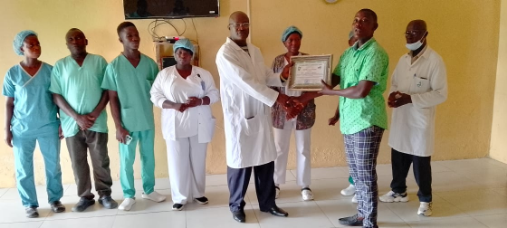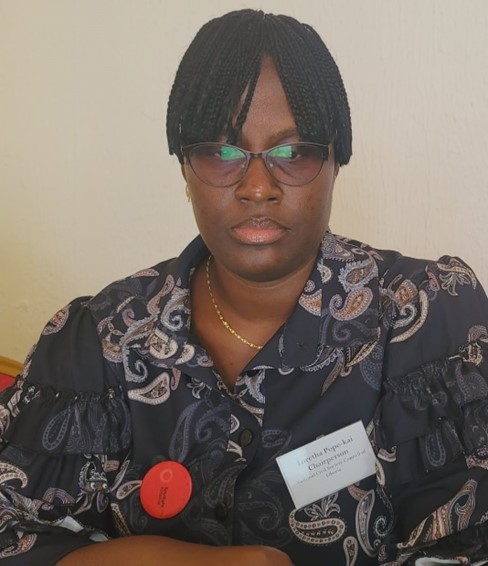Yesterday, March 15, 2022 Liberia celebrated the 213th birth anniversary of its first President, Joseph Jenkins Roberts, but with the United States Ambassador accredited near Monrovia, Michael A. McCarthy, releasing a shamefully damaging statement against the administration of the country, wondering what would ex-President Roberts have to say about Liberia today.
In his statement, titled, “What Would J.J. Roberts Have to Say about Liberia Today?” Ambassador McCarthy said, “As we celebrate the life of a great Liberian, born 213 years ago in the United States before emigrating to this land at 20 years old, I have been asking myself what Joseph Jenkins Roberts would say about Liberia today.
“Sixty years after the arrival of the United States Agency for International Development (USAID) in Liberia, 19 years after the end of the civil war crisis, and seven years after the eradication of Ebola, the taxpayers of the United States contribute to this country over $110 million per year of foreign assistance.
“This includes over $79 million per year donated to the health sector. Approximately $9 million is specifically for purchasing medications and commodities for the Liberian people and improving the Ministry of Health’s effective distribution and warehousing of pharmaceuticals.
“Despite this extra support, we learn regularly about places like Kolahun in Lofa County and Sanniquellie in Nimba County, where clinics and hospitals must make do without even the most basic drugs.
“Troublingly, Embassy investigations indicate that not only are some citizens diverting public medical resources and low-cost drugs for personal gain, but that babies, young children, and birthing mothers are dying needlessly as a result.
“What would J.J. Roberts have to say about this?
“As a Peace Corps volunteer, I was blessed to live for two years in villages (without electricity or running water) in West Africa. First thing every morning, each household would take advantage of the cool, early morning daylight to sweep inside and outside and dispose of debris. Villagers then coordinated with the local government to deliver waste daily to a designated landfill.
“The state of cleanliness in the city of Monrovia, which is more developed and a far wealthier community, sadly does not compare.
“Last month, I was surprised at the words of city leadership on Monrovia Day. A senior official lamented that, unlike his previous three years in office, “no donor or external partner is funding the recurrent cost of solid waste collection and disposal,” implying that he was abandoned by the international community. Is there a more basic local government responsibility than the collection and proper disposal of garbage?

“Would Liberia’s first president have imagined that, 175 years after independence, foreigners should be held responsible for the removal of garbage in his capital city?
“On February 25, we learned that a Rhode Island State Representative, Nathan W. Biah, Sr., is donating electronic voting equipment to the Liberian House. This is not the first of such equipment donated to help make Liberia’s top legislative body more transparent to its citizens.
“I have been reliably informed that a previous e-voting system was installed in 2014 by the U.S. taxpayer-funded National Democratic Institute (NDI), but it was never used.
“For his part, President Weah said during his December 10 Summit for Democracy speech (https://www.state.gov/official-interventions-the-summit-for-democracy/): ‘Over the next year, we intend to introduce legislative transparency by making all votes public so that constituents can hold their lawmakers accountable for their actions, which is a fundamental element of any healthy democracy.’ I hope the Legislature embraces this latest opportunity to increase citizen awareness of the actions of their elected officials.
“Would J.J. Roberts have believed that in modern Liberia, a constitutional republic where “all power is inherent in its people,” legislators would purposely neglect to use a tool created to educate citizens on how their democratically elected representatives vote?

“The United States of America has, no doubt, also failed to live up to some of the aspirations of our first president, but I believe George Washington would be pleased to know that the country he fought to establish would today be working to support democracy and fight corruption both at home and in places like Liberia.
“The U.S. House of Representatives introduced Resolution 907 on February 4 of this year, which encourages Liberia to redouble its efforts to counter corruption and advance the causes of human rights. It also urges Liberia to implement critical economic reforms necessary to accelerate sustainable economic growth and human capital development.
“Finally, it calls on the U.S. Treasury and State Departments to continue to impose targeted sanctions against those responsible for undermining the rule of law and trust of the Liberian people through corruption, gross violations of human rights, and other acts that threaten the peace and security of Liberia.
“Days later, in her address at SKD Stadium on February 14, Special Assistant to the President of the United States Dana Banks stated that ‘corruption eats away at the democracy you have worked so hard to build. But ultimately, only the Liberian Government and the Liberian people can tackle corruption, fight for accountability and transparency, and move this country forward.’
“As these statements indicate, the U.S. Government is sufficiently concerned about corruption in Liberia to sanction individuals. Corruption leads to citizen frustration and has had destabilizing effects on countries in the region. It poses significant risks to peace and democracy.
“How would Liberia’s first statesman feel to know that his country’s top ally was compelled to sanction members of Liberia’s government just to preserve rule of law and the democracy he helped establish?
“I wonder.”







